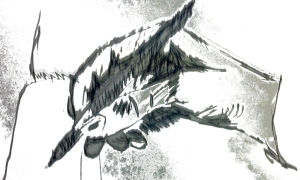I may be mistaken, but it is my belief that we’ve all been to that dark, lonely place at least once or twice in our lives where we, and the lives we have led, seem…
Insignificant.
Less than.
Pointless.

It’s a scary place and one which I suspect, and hope, the majority of us visit only infrequently and fleetingly because our lives are fulfilling and rewarding enough to steer us clear from the depression that can lead us there.
However, I also suspect that there is a significant minority of us who visit this dark, lonely place more often and for longer periods than most since, according to NAMI, the National Alliance on Mental Illness, nearly 19% of the United States’ adult population experience some degree of mental illness throughout the year [1]. And, according to the National Institute of Mental Health, major depression is one of the most common mental disorders in the United States [2].
I, myself, became a frequent visitor of this dark, lonely place not long after I began taking high doses of the steroid prednisone to combat a deadly disease that was destroying my lungs, and one which I was given little chance of surviving.
It was a hard enough to mentally process that my life may soon be ended by an aggressively fatal disease — pretty tough for anyone to process, I would imagine — but couple that bummer news with a steroid that induces psychosis-like side-effects and, yeah… double bummer.
Consequently, it wasn’t long before I found myself spending nearly as much time in that dark, lonely place as I was out of it.
It’s hard to explain what I and my mind were going through whenever I visited there. I’m not sure there is a way to describe it wholly in just a few words. It is both a tangible and intangible feeling. A cold feeling sometimes. A heavy feeling other times. But it was almost always a feeling of pointlessness. A feeling of… Why bother?
I was dying. My body had failed me and I had failed my family. The only thing I felt I was good for now were my less than adequate disability checks. Were I gone, my life insurance payout would have been much more rewarding and helpful for those whom my absence would release from the burdens my illness had placed upon them.
Yeah… I was down there in that indelible darkness of depression pretty deep.
Fortunately for me I had a saving grace — several of them, in fact.
One, the primary one, was a support network of family and friends who loved me, cared for me, and prayed for me.
Another, was that I like to write.

I began blogging shortly after my leukemia diagnosis. Nothing too deep or introspective — though scared, I was completely confident I was going survive — just updates to keep my friends and family informed of my health and happenings during my treatment.
But months later after learning my lungs were slowly dying away as a side-effect result from my bone marrow transplant, and having to begin a hefty prednisone regiment in an effort to slow the dying process down, my positive perspective on things changed significantly.
Though the drug-induced and drastic mood swings made it difficult to focus, I began to blog more often and about more personal matters. And while I regard my blogging experience during this difficult time as a very beneficial, therapeutic activity — an activity I presume many others regard beneficial as well, for a simple Google search of the term “writing therapy” resulted in around 259,000,000 results — it wasn’t helping me to shake the persistent feeling of irrelevance; of feeling that I others would better off if I were dead.
Fortunately for me, since I was spending more time thinking deeply about my life for my blog, I eventually began tinkering with my blog’s “About” page.
And this tinkering proved to be yet one more saving grace; for it led me on a path to try to discover things about myself that others might find interesting enough to inspire them to read more of my writing.
And once I began thinking in more of a self-promotional, third-person kind of way about my life, I began realizing and rediscovering things about myself that I found to be very special and unique.
For the next week or so, I stopped blogging altogether and, like a gold digger after finding his first valuable nugget, I worked passionately on mining through my past to dig up and write down all the meaningful nuggets I could find.
And when I was finally satisfied that my life was properly represented on the page, I began to craft the long, meaningful list of me into a voice that, when others read it, would be heard distinctly as mine.
When I was finished*, my “About” page was more than just being about me… it was me.
And even now when reading this long and winding written documentary of me, I am filled with a sense of gratitude and purpose so powerful that, even if I were to once again visit that dark, lonely place, I could never do so feeling as if my life were pointless and without meaning.
1. https://www.nami.org/Learn-More/Mental-Health-By-the-Numbers
2. http://www.nimh.nih.gov/health/statistics/prevalence/major-depression-among-adults.shtml
*As I live and grow, so too does my “About” page. It will never be finished completely… until I am.

